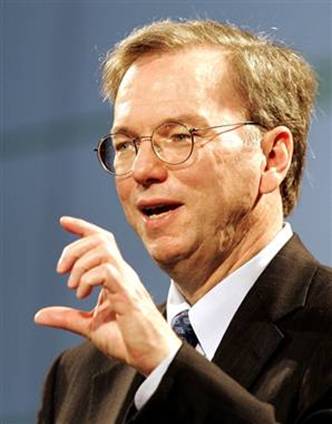|
Journalism at a Precipice Google et al vs. The Newspapers: By Sydney H. Schanberg |
|
|
Eric Schmidt, chairman and chief
executive officer of Google, Inc |
Caught in the web. |
|
By Sydney H. Schanberg There have been, in recent years, some whopping
negatives that temporarily diminished the credibility of the mainstream press
– the most egregious of them being the failure to debunk the Bush
Administration’s false intelligence that led the nation into the Iraq war. But the threat that faces the press now has
nothing to do with our professionalism or reporting skills. The dark cloud
this time is the economic meltdown in the newspaper industry, which is
literally strangling the reporting profession. Computer screens connected to the internet, not
newspapers, are where more and more people around the world are getting their
news. And the advertising that once supported the newspapers’ biggest expense
– the salaries of the reporters and editors necessary to produce
professional, reliable information -- has also migrated to the Internet. So
newsrooms have been shrinking at a hastening pace, as more and more
staffers have to be laid off. A number
of papers have already folded, while others have gone into bankruptcy
proceedings. The staff cuts across the country are so numerous that they are
now almost daily news stories themselves. The bitter paradox of this sea-change is that the
news stories that appear on the Internet now are still coming from the same
beleaguered newspapers. But not a penny is paid to the papers. The looters
simply “aggregate” the news stories by linking to the papers’ own websites.
“Aggregation” is the new-age euphemism for grand theft. Isn’t this illegal? I think so. But the papers were
slow to band together and go to court to defend their copyrighted material.
They seemed to give up the ghost, accept the looting and begin groping for a
new “business model” to replace the lost advertising revenue. As I write this
article, with the situation deteriorating, there are some stirrings in the
print world to coalesce, get mad and go after the looters. It’s the only way
to bring about some fairness, since the “aggregators” are still insisting
that their free ride is completely legal. The biggest violator is Google, the
multi-billion-dollar information gatherer and dispenser that sits atop the
Internet business world, its coffers over-flowing despite the tanked national
economy. As the saying goes, the Google slickers have been laughing all the
way to the bank. And there are a myriad of smaller Internet news
and commentary sites doing exactly the same thing. A leading example is the Huffington Post. Arianna
Huffington, a smart, ambitious person on the move, has created a successful
website whose advertising supports the comfortable lives of herself and her
financial partners. The Huffington Post presents a daily smorgasbord of
stolen stories and the blogging rants of Arianna’s wide collection of
celebrities and friends who don’t mind not being paid as long as their names
and faces are out there. Arianna has only a handful of paid employees –
mostly the worker-bees and techies who do the aggregating and tend to the
digital mechanics. After a barrage of criticism that she initially ignored, Arianna
recently announced that she plans to spend nearly two million dollars to
build an investigative team that will produce original work. It’s about time,
Arianna. Let’s see what it produces. Tina Brown is another, but somewhat different,
example. Late last year, the writer and magazine editor started up a
competitive news website called the Daily Beast. Though she, too,
appropriates stories she also immediately began publishing and paying for
original content. Kudos to her – in the hope that she will eventually pay for
her purloined content as well. Those who contend that the Internet will fill
whatever gaps are left by the demise of newspapers have been, however, unable
to answer the key question: If
newspapers become faded relics, who will do the serious investigative
journalism that holds government and other power centers accountable? That
kind of journalism – so critical to a democracy – has been diminished by the
newspaper layoffs, and the Internet has shown little interest in taking on
this challenge. Investigative stories are labor intensive. They often take
several months or more for a duo or team of reporters to produce. In short,
deep-digging journalism is costly. And newspapers have always done the bulk
of it. The cheerleaders for Google and its free-loading
sister souls (who include Drudge and Yahoo) say that the Internet was
invented to make all information free.
Some of these acolytes talk as if they’re rooting for newspapers and their
product to die off entirely. But if newspapers disappear and the Google world
continues to refuse to do its own original reporting, where will serious
journalism come from? Hollywood? Lobbyists? Derivative brokers? One of Google’s most active cheerleaders is Jeff
Jarvis, who teaches at the CUNY Journalism school, does consulting and
maintains a blog called “Buzz Machine.” In early April, Jarvis composed and posted on
“Buzz Machine” the “get-lost” speech that he thought the Google CEO, Eric
Schmidt, should deliver bluntly to the nation’s newspaper publishers. The
latter were then gathered in San Diego at the annual meeting of the
Associated Press, a news service co-operative formed by newspapers in 1846. The running theme of Jarvis’s proposed speech, addressed
to the publishers and repeated several times, was: “You blew it.” The
language was hostile, nasty and dismissive. Here are some samples: Jarvis says, referring to
the publishers: “They’re preaching up at their own choir loft with angry,
self-righteous fire and brimstone about their plight…Well, gentlemen –and
that’s pretty much all I see before me: angry, old, white men – you have no
right to anger. Instead, you are the proper objects of anger. The public
should be angry with you for the poor stewardship you have exercised over the
press and its service to society….Yesterday, you delivered a foot-stomping
little hissy fit over Google and aggregators. How dare they link to you and
not pay you?....Google and aggregators and bloggers are bringing value to
you; they should be charging you for the value they bring. You should rise up
today and give Mr. Schmidt a big thank you for not charging you. But you
won’t, because you’ve refused to understand this new business reality. You
blew it.” Schmidt, who spoke to the publishers on April 7,
didn’t deliver the ugly Jarvis speech, but he didn’t offer any olive branches
either. His address was narcissistic and self-serving. He told the
newspapermen they should reinvent their businesses to be more like Google and
the aggregators. He gave no ground on his use of newspaper product without
paying. On the day before Schmidt’s speech, William Dean
Singleton, chairman of the Associated Press, had addressed the publishers’
meeting and announced that his news service and its member newspapers (which
include the nation’s largest papers) would henceforth take legal action
against websites that took the work of news organizations without first
gaining permission and agreeing to share revenue with them. “We can no longer stand by,” said Singleton, “and
watch others walk off with our work under misguided legal theories.” (The
Singleton speech was what Jarvis had labeled “a foot-stomping little hissy
fit”) So, belatedly, the inevitable legal clash has
begun. I hope the story rustlers are made to stop
stealing. They give rustling a bad name. But it’s hardly a sure thing. Googie bases the legality of its behavior on
something called the “fair use” doctrine that evolved in copyright cases over
the years. But this doctrine is now just as antiquated as the typewriter,
linotype machines and carbon paper that used to put out newspapers. Just as
newspapers have had to revamp themselves because of the new electronics that
have utterly transformed the delivery of information, so too must the “fair
use” practice be brought up to date to fit today’s technological
realities. “Fair Use” allowed someone
to use a few paragraphs of someone else’s published work. Now Google and the other appropriators give you a link to the
entire text while keeping all the advertising income for themselves. Still, some key newspaper executives seem
hesitant about mounting a serious fight to create a fairer playing field. The
other day, Bill Keller, executive editor of The New York Times, chose to disagree
with Robert Thompson, his counterpart at The Wall Street Journal, who had
said publicly that Google and other aggregators function like “parasites or
tech tapewoms.” According to The Observer, where Keller’s remarks
appeared, the Times editor said instead, “Google is one of those companies
that we generally refer to as frenemies,”He said that though Google was
self-interested and building an empire, it was at the same time an “ally” of
newspapers. With allies like Google, …..well, you know the rest. Keller added that The Times was pursuing a
“carrot approach” to Google. While the two “frenemies” talk softly in public,
it seems obvious that until The Times gets serious in this struggle, only one
side will be carrying a big stick. |
|

